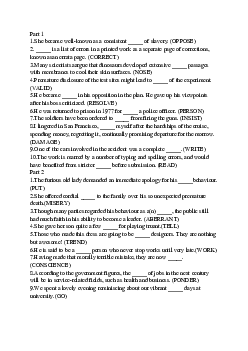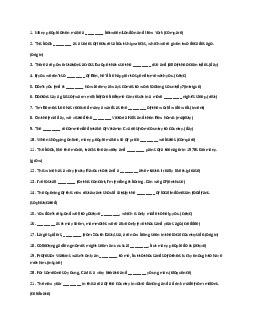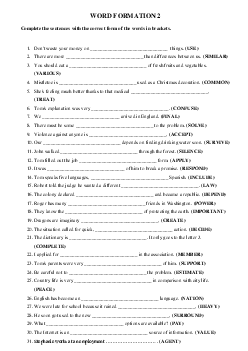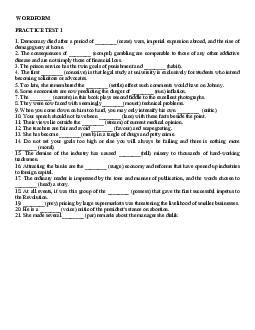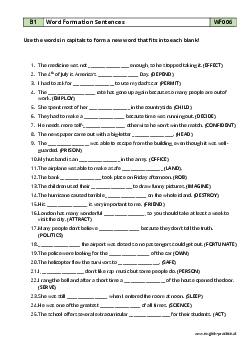





Preview text:
here are many idiomatic pairs like these usually with the linking word of and in English. There are pairs of
adverbs, pairs of nouns and identical/prepositional pairs like those you have listed, Yvette, as well as pairs
of adjectives and pairs of verbs used as set phrases or idiomatically. I can only list a few of the most commonly used.
An idiom is a number of words which when taken together have a different meaning from the meaning of
each individual word. This is what causes the difficulty. But idioms where there is some association with the
original meaning are easier to understand than those where there is no association with the original meaning of the words.
Try to guess the meaning of the following, first by attempting to decipher them word for word. Then, check
your understanding by reading examples of how they are used in context. Finally, check again against the explanations given.
noun pairs and verb pairs
Here are some common idiomatic pairs in English: peace and quiet, body and soul, life and limb, grin
and bear it, bow and scrape, rant and rave
It's impossible to get any peace and quiet in this house with you two arguing all the time.
She puts body and soul into her work with the girl guides. She is an inspired leader.
You'll risk life and limb if you decide to go white-water rafting after such heavy rainfall.
I know this hotel isn't very good, but all the better accommodation is taken, so we'll just have to grin and bear it.
I've asked him politely already. Surely he doesn't want me to bow and scrape.
He was ranting and raving about the price of everything in Britain. Why doesn't he go and live abroad, if he's unhappy?
peace and quiet = a period of quiet and calm, often with: have/get/enjoy some
body and soul = physical and mental energy, as in: put body and soul into
life and limb = risk death or serious injury, as in: risk life and limb
grin and bear it = put up with something unpleasant because it cannot be changed
bow and scrape = show too much respect to someone
rant and rave = protest or complain in a loud and excited manner
adverbial pairs and adjectival pairs
Here are some examples: here and there, now and again, first and foremost, short and sweet, safe
and sound, sick and tired
I could see a number of houses scattered here and there over the hillside.
How often do you see her now? ~ Every now and again. Not as regularly as I used to.
Why don't you get a job that pays more? ~ First and foremost because I really enjoy the job I'm doing.
I'll try and keep this short and sweet. I know you don't want to stay here longer than you need to.
Oh, I'm so glad to have you back home safe and sound. I was beginning to get worried about you.
I'm sick and tired of hearing your excuses. It's about time you did an honest day's work.
here and there: to or in several places
now and again: occasionally
first and foremost: most importantly
short and sweet: not too complicated, as in a speech, often with keep/make it
safe and sound: not harmed at all
sick and tired: extremely annoyed with someone, often with of hearing/listening
identical / prepositional pairs
Here are some examples: on and on, again and again, round and round, up and down, little by little, all in all
You needn't go on and on about needing a holiday. I know we haven't had a break for over a year now.
I've told you again and again to stop swearing in front of the children, but you take no notice.
We're not making any progress by arguing like this. We're just going round and round in circles. My head's
beginning to go round and round.
How are you getting on now? ~ Oh, up and down, as usual. I have good days and bad days.
Little by little his heath improved and he was able to walk further and further each day.
All in all, it was a successful holiday in spite of some scary moments.
on and on: without pausing or stopping, usually with go
again and again: repeatedly
round and round: moving in circles or spinning, usually with go
little by little: gradually or slowly
all in all: taking everything into consideration leaps and bounds
Leaps and bounds, Yvette, is really a prepositional idiom as it is always prefaced by the
prepositions by or in. If you do something by leaps and bounds, then you are making rapid or spectacular progress:
I feel that my English is coming on in leaps and bounds now that I can understand idioms.
by and large = in general.
I guess the team played quite well, by and large.
chapter and verse = with a lot of details.
The teacher gave them chapter and verse about where to find the information.
far and wide = everywhere.
She tried far and wide to find the keys but she couldn't. She had to take a taxi instead.
first and foremost = most important.
First and foremost, I would like to thank you all for this welcome.
forgive and forget = forget enmity.
Let's be friends again, I'm sorry for what I've done, but you have to forgive and forget.
free and easy = relaxed, friendly.
She knew that life wouldn't be so free and easy at work. hit and miss = random.
I don't know how to operate this machine, it's just a question of hit and miss for me!
live and learn = become wiser.
You trusted her and she deceived you. You live and learn, so don't get fooled again.
in and out = entering and leaving a place.
The boss has been in and out all day, to see if the employees were working.
loud and clear = very clearly.
Even though he was 400km away, I could hear him loud and clear on the telephone line.
now and again = occasionally.
They like to go to a concert now and again.
on and off = not all the time, at irregular intervals.
It's been raining on and off all day, I hate this kind of weather.
over and out = message used to end a radio communication. Understood. Over and out.
sink or swim = be successful or fail.
This a very difficult job, you have to be careful. It's really sink or swim.
up and about = in good health.
After the accident, he recovered very well, he's now up and about.
wait and see = wait patiently.
We don't know if this government will be able to put his plans into practice. We have to wait and see.
Today, we are going to deal with "adjective and adjective" idioms. They are usually two
adjectives with similar meanings that reinforce the idea given by each of them. As in other
idioms, the order of the elements cannot be changed: You can say "alive and kicking", but
"kicking and alive" is not possible. Let's see some of them:
Alive and kicking (also alive and well): Well and healthy, active. It is disappointing to
see that racism is still alive and kicking.
Safe and sound: unharmed and healthy after going through a difficult situation: We
drove along a narrow, winding road, but we arrived home safe and sound.
Cut and dried: decided and determined beforehand, lacking freshness and spontaneity,
decided in a way that cannot be changed: When it comes to the music industry, there is no cut
and dried formula for success.
Hale and hearty: healthy and strong: He didn't look as hale and hearty as his wife, but
for a man in his late fifties, he looked good.
Bright and breezy: cheerful and full of energy: Maggy is always bright and breezy in the mornings.
Fair and square: honestly and according to the rules: The Socialist Party won the
election fair and square. In a direct way that is easy to understand: I told him fair and square to go away.
spick and span: neat and clean: Mary's house is always spick and span. She's so houseproud!
Free and easy: relaxed: Life is never going to be as free and easy as it used to be when we were young.
Sick and tired: annoyed or fed up with someone or something to the point of losing
one's temper: I'm sick and tired of wasting my time at long, poinless meetings.
Meek and mild: quiet, gentle, and always ready to do what other people want them to
do, without expressing their own opinions. "Gentle Jesus, meek and mild" is a christian hymn.
Short and sweet: dealt with very quickly, to the point: We haven't got much time, so I'll
keep it short and sweet.
First and foremost: most important. First and foremost, I would like to thank you all for
coming. (Sometimes we leave the most important thing till the end, in which case, we use "last but not least")
Black and white: having no colours except black, white and shades of grey: A black and
white film / photograph / television. The expression "in black ad white" means "in writing" or "in
print": I never thought they'd put it in black and white on the front page. High and dry: stranded, in a difficult situation, without help or money: When we were about to catch the bus, the driver set off and left us high and dry. Contrast
checks and balances
day and night/night and day do or die dos and don'ts give and take
[come] hell or high water hill and dale high and low ins and outs open-and-shut pros and cons
[come] rain or shine ups and downs Emphasis airs and graces an arm and a leg be-all and end-all bells and whistles
blood and guts/thunder
[rain] cats and dogs cut and dried day and age
dazed and desultory
[between] the devil and the deep blue sea fire and brimstone flesh and blood high and mighty Ps and Qs plain and simple
[between] a rock and a hard place
simple and straightforward
ˌifs and/or ˈbuts. (often used in negative sentences) used to stop somebody arguing, protesting or
making excuses when you tell them to do something: I want this work finished by Friday and no ifs and buts
There are some phrases that pair synonyms where one of the words is considered archaic, for example: kith and kin time and tide
